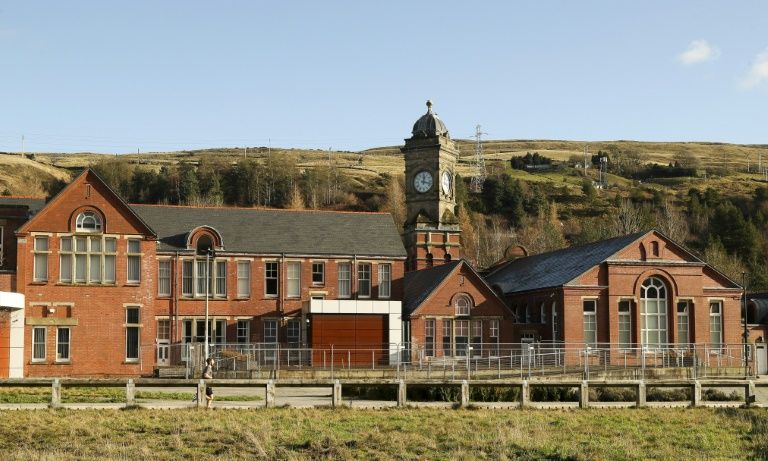Welsh former steel town Ebbw Vale braces for post-Brexit era
Despite receiving millions from EU funds targeting Europe’s poorest regions, Ebbw Vale backed Brexit more strongly than any other Welsh town. ©AFP/File GEOFF CADDICK
Ebbw Vale (United Kingdom) (AFP) – In a few weeks’ time, Britain leaves the European Union single market and Brussels turns off the tap of financial support for the country’s most deprived regions.
But many locals in Ebbw Vale, south Wales, are hoping Prime Minister Boris Johnson has the answer.
A huge silvery dragon brandishes its claws in the main square in Ebbw Vale, a sleepy town that was once a major centre for steel production.
The dragon is Wales’ national symbol but for many locals, the eye-catching statue also represents mismanagement of money that poured in from the European Union.
Despite receiving millions of pounds from EU funds targeting Europe’s poorest regions, Ebbw Vale backed Brexit more strongly than any other Welsh town.
While the funding from Europe will stop, many locals said they expected to get more benefit from additional cash proposed by Johnson as part of his “levelling up” plan to reduce economic inequalities between regions.
If these funds materialise, “hopefully they’ll get directed to the proper place this time”, said 51-year-old unemployed resident Rowann Ogunfimbo.
The dragon statue “hasn’t been that widely accepted, and I think the rest of us just think it is a waste of money”, she said.
In her view, what the town needs is more facilities for young people.
“There’s nothing for the kids to do,” she told AFP. “They hang around and they get in trouble.”
A few yards away, a grey-haired woman smoking a roll-up, who asked to remain anonymous, gave a widely held view on EU money.
“We’ve received a lot of funds but we’ve paid a lot as well,” she said.
– Levelling up? –
In recent years, Wales has received around £750 million ($1 billion, 830 million euros) per year from EU structural funds aimed at boosting economic development as well as from agricultural funds and others.
The money has gone to regions such as Ebbw Vale, where traditional industries have died and unemployment is high.
Mark Davis, a retired social worker, said the town would feel the pain from the huge drop in funding, but insisted that Brexit was essential, even if it means tightening belts for years.
“It would be utopian to think we’ll have the same amount with levelling up,” he said. “The main thing is, we want to take back control of our own borders.”
The steel industry once brought prosperity to Ebbw Vale, employing more than 14,000 people as late as the 1960s.
But the south Wales region experienced a lingering decline from the 1980s, when then-prime minister Margaret Thatcher closed down coal mines.
In 2002, the Ebbw Vale Steelworks closed, too.
Since then, European structural funds have made a major contribution towards revitalising the town centre, building a new highway and, most importantly, redeveloping the steel plant’s vast site.
Now it houses a large centre for both technical and university education, including cutting-edge engineering facilities.
A group of teenagers were vaping under a poster boasting: “Europe and Wales: investing in your future.”
Dan Coles, director of external engagement at Coleg Gwent group of further education colleges, said he suspected “there will be less funding available to us” while European structural funds made it possible to broaden the education available locally.
Nevertheless he acknowledged that “lots of people… didn’t feel the benefits of these funds in their lives”.
– ‘Massive mistake’ –
Mark Pope, an engineering lecturer at Coleg Gwent, called Brexit a “massive mistake”. It was all lies for strategic reasons and people believed it, he said.
As talks between London and Brussels on a post-Brexit trade deal continue, Pope said he expects major car manufacturers to pull out if nothing is agreed.
That would leave large numbers of small and medium-sized businesses without any customers and bring fresh waves of layoffs in a country battered by Covid-19.
“People were persuaded to harm themselves. The poorest communities in Wales will be the hardest hit by Brexit,” said Derek Vaughan, a former Labour member of the European Parliament for the region.
During his Brexit campaign, Johnson claimed that an independent Britain would at least match EU funding.
Vaughan, however, warned that this was impossible, because the “numbers are so huge”.
“We have a month to go… and we still don’t know how much the government will give to Wales,” he added.
“We don’t know how the funds will be allocated, will they be distributed by the government or by the Welsh authorities?”
If Downing Street does not fully make up for the funding loss, “there is the possibility of the economies of these regions, including Wales and the northeast (of England), falling behind more prosperous areas,” said Josie Dent, managing economist at the Centre for Economics and Business Research consultancy.
Disclaimer: Validity of the above story is for 7 Days from original date of publishing. Source: AFP.


